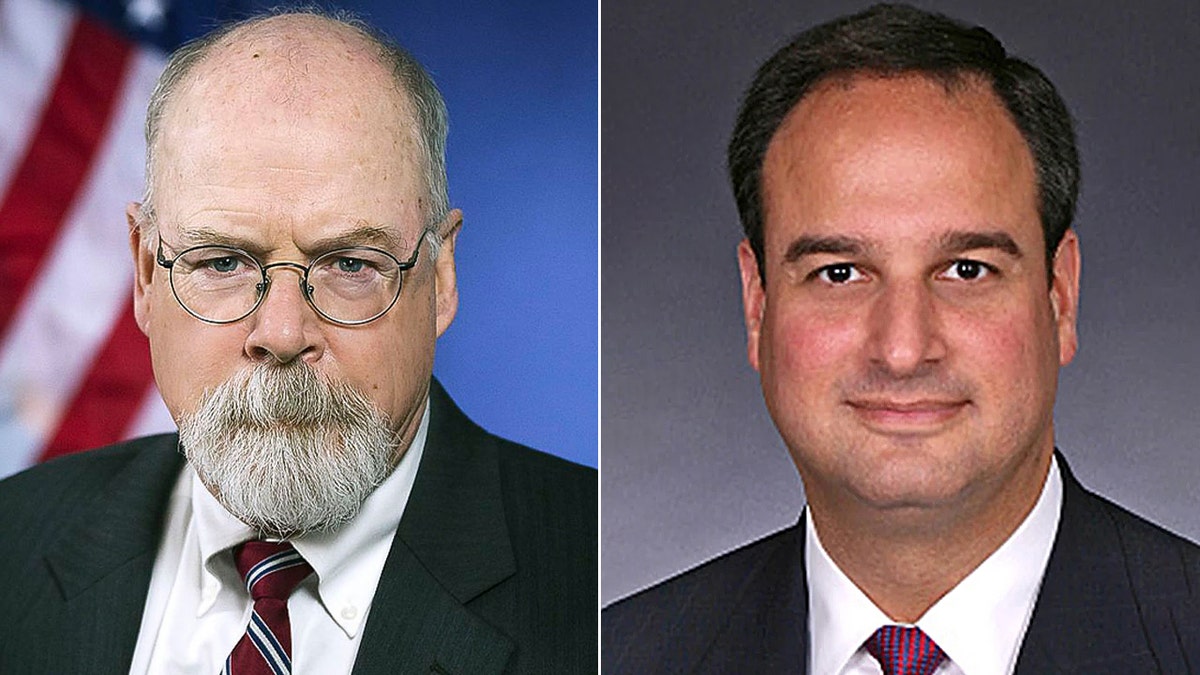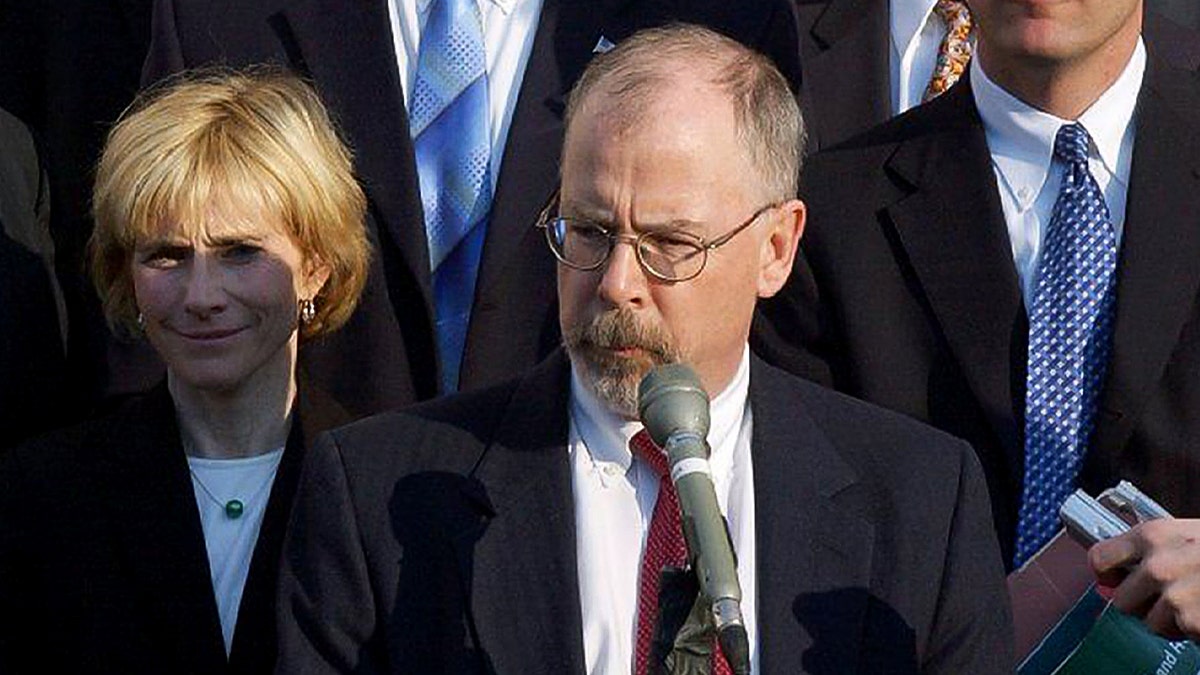Special counsel John Durham releases evidence against Clinton lawyer: 'The same lie in writing'
Fox News correspondent Kevin Corke discusses John Durham releasing a text message from Clinton lawyer Michael Sussman on 'Jesse Watters Primetime.'
The federal judge presiding over the case of former Clinton campaign lawyer Michael Sussmann denied his request to dismiss the case brought against him by Special Counsel John Durham Wednesday, ordering that the trial go forward as planned next month.
Sussmann, in February, filed a motion to dismiss the case against him. Sussmann was charged with making a false statement to a federal agent, and has pleaded not guilty.
In a court filing Wednesday, U.S. District Judge Christopher Cooper outlined the charges against Sussmann brought by the Durham impaneled grand jury last year.
Cooper detailed Durham's indictment, which alleges that Sussmann told then-FBI General Counsel James Baker in September 2016, less than two months before the 2016 presidential election, that he was not doing work "for any client" when he requested and held a meeting in which he presented "purported data and 'white papers' that allegedly demonstrated a covert communications channel" between the Trump Organization and Alfa Bank, which has ties to the Kremlin.

John Durham and Michael Sussmann (Sussman pic: Perkins Coie)
"Specifically, Sussmann allegedly told Baker that he was not attending the meeting on behalf of any client when, in fact, he had assembled and was conveying the information on behalf of two specific clients: (1) a technology-industry executive named Rodney Joffe and (2) the Hillary Clinton presidential campaign," Cooper wrote.
DURHAM PROBE: JUDGE REJECTS SUSSMANN REQUEST TO ‘STRIKE’ SPECIAL COUNSEL’S 'FACTUAL BACKGROUND’
"The FBI opened an investigation based on the information Sussmann provided, but ultimately determined that there was insufficient evidence to support the existence of a communication channel between the Trump campaign and the Russian bank," Cooper wrote. "Sussmann has pled not guilty to the charge and denies lying to the FBI."
Cooper wrote that Sussmann’s "sole argument for dismissal" of his case is that "even taking the allegations in the Indictment as true, his purported misrepresentation to Baker was immaterial as a matter of law and therefore cannot support a conviction" under U.S.C. 1001 – making false statements to a federal agent.
"The court will deny the motion," Cooper wrote, noting that the standard for materiality under U.S. code is "whether the statement has ‘a natural tendency to influence, or is capable of influencing, either a discrete decision or any other function of the [government] agency to which it was addressed.’"
CLINTON CAMPAIGN LAWYER SUSSMANN FILES MOTION TO DISMISS DURHAM PROSECUTION
Cooper explains that Sussmann argued that his alleged statement to Baker – that he was not at the meeting on behalf of a client – "could not have possibly influenced what was, in his view, the only ‘discrete decision’ before the Bureau at the time: whether to initiate an investigation into the Trump campaign’s asserted communications with the Russian bank."
Cooper said that Sussmann "largely ignores the second part of the test: whether the statement could influence 'any other function' of the agency."
"Sussmann seeks to cabin this holding to statements made during the course of an ongoing investigation, but the Court sees no basis for that bright-line divide," Cooper wrote. "As the Special Counsel argues, it is at least possible that statements made to law enforcement prior to an investigation could materially influence the later trajectory of the investigation. Sussmann offers no legal authority to the contrary."
Cooper notes that whether Sussmann’s alleged statement "was in fact capable of influencing either the commencement or the later conduct of the FBI’s investigation is a very different question, and one that the parties hotly dispute."
"The battle lines thus are drawn, but the Court cannot resolve this standoff prior to trial," Cooper wrote.
Meanwhile, Cooper, last month, rejected Sussmann's motion to "strike" a "factual background" section in a Durham filing in February.
Sussmann’s legal team filed that motion in February demanding that the court "strike" portions of Durham’s Feb. 11 filing, including the "Factual Background" section, claiming it would "taint" a jury pool.
"I’m not going to strike anything from the record," Cooper said during a status hearing last month. "Whatever effect the filing has had has already passed."
Durham, in the Feb. 11 filing with the "Factual Background" in question, alleged Sussmann provided two U.S. government agencies with information from a tech executive that attempted to tie Donald Trump, who was a presidential candidate at the time, to Russia-based Alfa Bank.
The tech executive has since identified himself as Rodney Joffe. Joffe is not named in Durham’s filing and has not been charged with a crime.
Durham alleged that Sussmann, Joffe and Joffe’s associates "exploited" internet traffic about a "particular healthcare provider," Trump Tower, Trump’s Central Park West apartment building and the Executive Office of the President of the United States in order to "establish ‘an inference’ and ‘narrative’" tying Trump to Russia.
Durham alleges Sussmann’s "billing records reflect" that he "repeatedly billed the Clinton campaign for his work" on the Alfa Bank allegations.

U.S. Attorney John Durham outside federal court in New Haven, Connecticut. ( Bob MacDonnell/Hartford Courant/Tribune News Service via Getty Images)
Sussmann’s legal team, in its motion to "strike" the allegations, said Durham had "done more than simply file a document identifying potential conflicts of interest."
"Rather, the special counsel has again made a filing in this case that unnecessarily includes prejudicial – and false – allegations that are irrelevant to his motion and to the charged offense, and are plainly intended to politicize this case, inflame media coverage and taint the jury pool," Sussmann’s lawyers said.
In a separate motion, Durham argued there was "no basis" to "strike" any part of his filing and pushed back against claims that his office "intentionally sought to politicize" the case. He defended the "additional factual detail" he included, which he argued is "central to proving" Sussmann's "alleged criminal conduct."
CLICK HERE TO GET THE FOX NEWS APP
While he did not grant Sussmann’s motion to strike, Judge Cooper on Thursday appeared to criticize the prosecution, saying the latest "dust-up" strikes him "as a sideshow."
Sussmann’s trial is set to begin on May 16.
















































